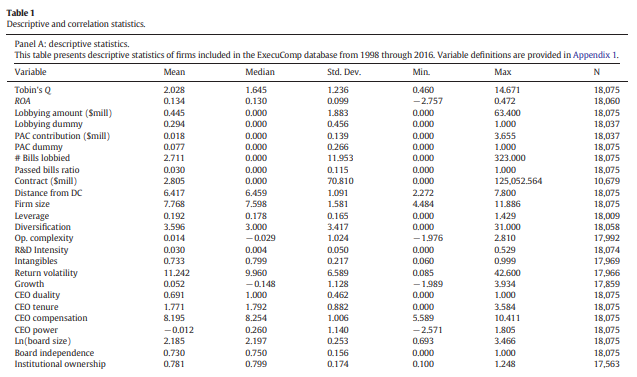According to the research paper referenced in the linked Bloomberg article, lobbying does benefit companies in certain circumstances. The overall results of the research is that on average companies receive a net loss from their lobbying efforts, however certain companies/situations do receive a net benefit. Large companies lobbying for broad goals do not benefit, whereas small companies lobbying for specific goals do benefit.
Essentially, small and focused companies that have neither the operational complexity nor lack of executive oversight that is inherent in large firms not only have significantly smaller losses on average, but in some cases benefit from the lobbying.
Unfortunately, the paper is behind a paywall. Luckily, my old university credentials still work, so I was able to view the full paper. The paper performs statistical analysis which, even if I fully understood it, could not be adequately examined in a StackExchange answer. So, this answer will just focus on what data was used, and what conclusions were reached.
Data Examined: In the paper's own words:
We obtain lobbying data for the years 1998 to 2016 from the Center for Responsive Politics (CRP). CRP is a non-profit research
group that operates out of Washington D.C. and analyzes the effects of lobbying on the legislative process. It maintains a publicly
accessible database on lobbying expenditures and campaign contributions at OpenSecrets.org. We also obtain data from CRP on
amounts spent by specific firms, lobbying spending on bills presented to the US congress, along with the success (or otherwise)
of the bills.
...
Thus, we start with an initial sample of 21,215 firm-years and data availability constraints reduce it to a final sample
of 18,075 firm-years from 2186 unique firms.
So, they examined 18 years worth of publicly available data covering 2,186 firms which have a combined 18,075 years of lobbying effort. I don't know enough about econometrics to know for sure, but this seems like the paper has solid data backing to base conclusions on.
Conclusions: To reach their conclusions, they examined relationships between a large number of variables and performed various econometrics measurements, such as Arellano–Bond estimation, propensity score matched analysis, 2SLS (IV) estimation, and others which I do not have enough statistics degrees to understand but certainly seem thorough.
However, what I can understand are sections from the conclusion:
Lobbying refers to corporate practices designed to influence regulations and public policies... Research has documented high returns on this
form of political investments in certain circumstances. Regardless of the outcome of firms' lobbying efforts, the lobbying process
itself may also help firms stay informed of regulatory agenda and extend their political ties.
In short, research has shown that in certain circumstance lobbying results in large benefits for the lobbier, and allows corporations to know the details of upcoming regulations so they may prepare for them.
In contrast, other research finds that
there are no returns or even negative returns to lobbying. These studies approach lobbying from an agency perspective and posit
that managers engage in lobbying to support political causes that they are personally interested in, even though such activities
may not benefit the firm and simply serve as another executive perk. Furthermore, inefficient managers may use lobbying to
hide their ineptitude behind public subsidies.
In short, other research has shown certain lobbying is not in the company's best interest, rather it is just something the upper executives want to do personally.
Given the conflicting perspectives and inconclusive empirical results in previous research, we reexamine the relationship between
lobbying and firm performance while using several rigorous techniques to explicitly control for endogeneity.
In short, this paper wanted to see which research was more correct, using a wide range of techniques.
Second, the finding of a significantly negative association between lobbying and firm performance supports the view that agency
costs, through which managers engage in lobbying in order to support private political causes or to mask managerial ineptitude,
outweigh strategic benefits of lobbying for an average firm. Our analysis further shows that the negative association may partly be
explained by the limited tangible benefits lobbying efforts bring about. Specifically, the amount of lobbying expenses a firm incurs
is neither significantly associated with the amount of government contracts awarded, nor with the ratio of bills passed (to the
total number of bills lobbied by the firm).
...
Our results show that the negative relationship between lobbying and firm performance is exacerbated by
the operational complexity of a firm. In contrast, for firms with high growth, the association between lobbying and firm performance
becomes significantly less negative (or more positive), suggesting that the benefits of policy protection for infant industries
can largely offset agency problems that come with lobbying. Taken together, our results highlight the fact that the negative link
between lobbying and performance documented in prior results is not universal. Rather, there are specific circumstances when
lobbying may be beneficial to firms.
The true overall results of this paper. After accounting for a variety of factors and performing a number of measurements on a large volume of data, the paper concludes that, on average, lobbying represents a net loss for a corporation, and that lobbying is "neither significantly associated with the amount of government contracts awarded, nor with the ratio of bills passed". Essentially, lobbying doesn't help the average company get the contracts or bills they lobby for. However, not all companies receive a net loss from their lobbying.
Addendum: a screenshot from the paper regarding the variables they examined:


